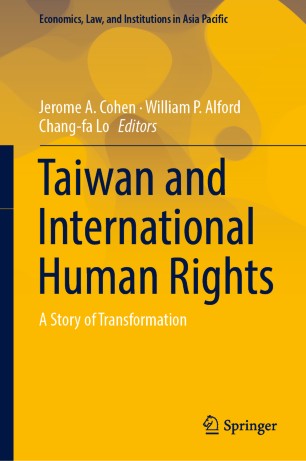
The editors are all major figures in their own right. Jerome Cohen is legendary for taking up the study of Chinese legal systems during the 1950s and 60s, when nobody else thought there was much point to it, and he was a professor to both Annette Lu and Ma Ying-jeou at Harvard in the 1970s. His opening chapter recounts some of his personal history pushing back against Taiwan's martial-law-era criminal justice system, and there are some eye-opening anecdotes in there. I did not know, for instance, that Cohen was instrumental in bringing a civil lawsuit in a Taiwanese court against the the killers of Henry Liu, and that he worked with future Kaohsiung mayor and DPP presidential candidate Frank Hsieh 謝長廷 to bring pressure on the KMT regime through its own court system.
William Alford and Chang-fa Lo are no slouches, either; Alford is a vice dean and director of East Asian Legal Studies at Harvard. Chang-fa Lo 羅昌發 was Dean of National Taiwan University Law School and served as a justice of the ROC Council of Grand Justices, Taiwan's constitutional court, from 2011-2019 (as a Ma Ying-jeou appointee). In 2020 he was appointed Taiwan's representative to the World Trade Organization by Tsai Ing-wen. So during his years of public service he has managed to receive support from both the blue and green camps.
Between them, they have assembled an extremely impressive group of legal scholars and practitioners to contribute 37 chapters on many aspects of human rights law in Taiwan. The authors are also a welcome mix of Taiwan- and overseas-based experts. This kind of international, English-language collaboration is hard to pull off, but the payoff comes from having Taiwanese voices featured prominently throughout the volume and a truly original set of sources and scholarship on this topic.
First, because of its diplomatic isolation, Taiwan isn't party to the key UN human rights conventions and treaties, but despite (because?) of that isolation, international law has been especially influential in the transformation of the human rights regime. For instance, in 2009 (when the KMT was the ruling party), the Legislative Yuan adopted into domestic law the two major human rights covenants, the International Covenant on Civil and Political Rights (ICCPR) and the International Covenant on Economic, Social, and Cultural Rights (ICESCR), and empowered Taiwan's courts to nullify other legal statutes inconsistent with provisions in the two treaties. Several chapters also focus on the efforts to turn the Control Yuan into a human rights commission or ombudsman that would give it a role more in line with international practices in other liberal democracies.
Second, Taiwan's legal system still rests on the foundations of the 1947 Republic of China constitution. In a rather odd twist, the protections for human rights enshrined there were actually quite advanced for its time, and that has helped to strengthen civil liberties in the democratic era. In particular, the survival of the ROC constitutional framework gave the constitutional court an outsized role in shaping the pace and direction of human rights reforms: in the 1990s, the court began to breathe life into constitutional aspirations that went mostly unfulfilled during the pre-democratic era and set legal practices and protections on a more liberal trajectory.
Third, Taiwan's current legal system is a remarkable mix of at least three very different traditions: Chinese Confucianism; European continental law (much of that itself first refracted through Japanese practice before coming to the ROC, or directly to Taiwan during colonial rule); and Anglo-American practices, most notably in the applications of US First Amendment jurisprudence to libel and free-speech cases. It is a truly unique concoction of influences, and as a result it is fascinating to watch debates over legal reforms play out there now.
I came away from this book convinced that in addition to the economic and political "miracles" that get most of the attention in scholarship on Taiwan's ROC-era transformation, there is also a human rights miracle that deserves separate consideration. Taiwan and Human Rights will be an important reference for anyone interested in Taiwan's evolution from a serial violator of human rights to one of its most enthusiastic proponents.
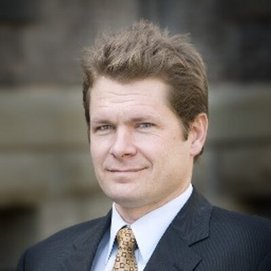
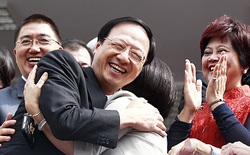
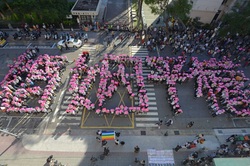
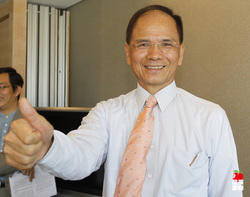
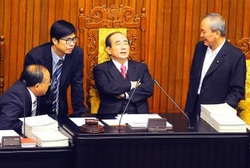
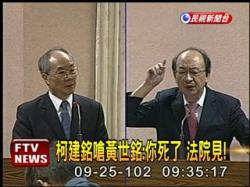
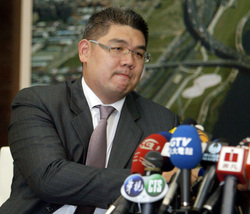
 RSS Feed
RSS Feed
